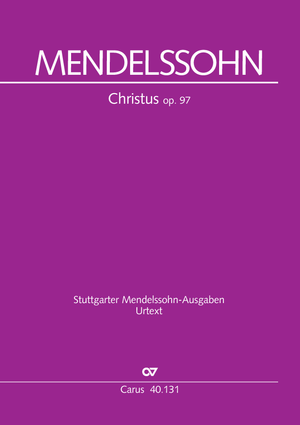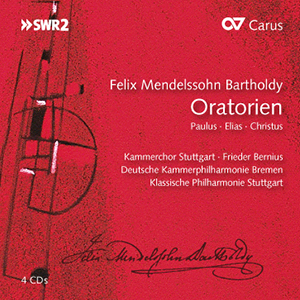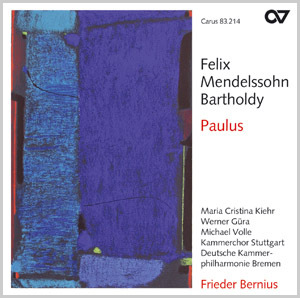
Felix Mendelssohn Bartholdy Christus. Kirchenwerke III (Bernius)
 Listen
(8)
Listen
(8)
- Kyrie in D minor
- Christus: Geburt Christi
- Christus: Leiden Christi
- Grant us, Father
- Why are the heathen so angry (Psalm 2)
- Judge me, o God (Psalm 43)
- My God, where hast Thou me forsaken?
- Jesus, meine Zuversicht
 Additional material
Additional material
- Purchase additional material as a download product.
-
 text (without music) for download, html file, Singing text, english translationhtml file, Singing text, english translation (Sample)Warum toben die Heiden (Psalm 2) Why rage fiercely the heathen, and the people mediate a vain thing?
text (without music) for download, html file, Singing text, english translationhtml file, Singing text, english translation (Sample)Warum toben die Heiden (Psalm 2) Why rage fiercely the heathen, and the people mediate a vain thing?
The kings of the earth they set themselves up,
and the rulers counsel take together against the Lord, and against his anointed.
“Now let us break their bands asunder, and cast away their cords from us!”
He that sitteth in the heav’ns shall laugh them to scorn,
and the Lord shall deride them.
In wrath he shall speak to them, and shall vex them in his sore displeasure.
“Yet have I set my King on Zion’s holy hill, yea, on my holy hill of Zion.”
I will declare the law where-of the Lord hath said, as the Lord hath said unto me:
“Thou art my Son, thee this day have I begotten.
Ask thou of me, and I shall give the heathen for thine inheritance,
utmost parts for thy possession.
Thou shalt break them in pieces with sceptres of iron,
like a potter’s vessel thou shalt dash them.”
O therefore be ye wise, o kings, ye judges of the earth be instructed.
Serve ye the Lord with fear, rejoice to him with trembling.
Kiss ye the Son, lest he be angry,
and ye perish from the right way.
Kiss ye the Son, for his wrath shall soon rekindle;
...
-
 text (without music) for download, html file, Singing text, originalhtml file, Singing text, original (Sample)Warum toben die Heiden (Psalm 2) Warum toben die Heiden, und die Leute reden so vergeblich?
text (without music) for download, html file, Singing text, originalhtml file, Singing text, original (Sample)Warum toben die Heiden (Psalm 2) Warum toben die Heiden, und die Leute reden so vergeblich?
Die Könige im Lande lehnen sich auf,
und die Herrn ratschlagen miteinander wider den Herrn und seinen Gesalbten:
„Lasst uns zerreißen ihre Bande, und von uns werfen ihre Seile!“
Aber der im Himmel wohnet, lachet ihrer, und der Herr spottet ihrer.
Er wird einst mit ihnen reden in seinem Zorn, und mit seinem Grimm wird er sie schrecken:
„Aber ich habe meinen König eingesetzt auf meinem heiligen Berge Zion.
Ich will von einer solchen Weise predigen, dass der Herr zu mir gesagt hat:
„Du bist mein Sohn, heute hab’ ich dich gezeuget;
heische von mir, so will ich dir die Heiden zum Erbe geben, und der Welt Ende zum Eigentum.
Du sollst sie mit eisernem Szepter zerschlagen, wie Töpfe sollst du sie zerbrechen.“
So lasset euch nun weisen, ihr Könige, und lasset euch züchtigen, ihr Richter auf Erden.
Dienet dem Herrn mit Furcht und freuet euch mit Zittern!
Küsset den Sohn, dass er nicht zürne und ihr umkommet auf dem Wege.
Küsset den Sohn; denn sein Zorn wird bald anbrennen.
Aber wohl allen, die auf ihn trauen.
Ehre sei dem Vater und dem Sohne und
...
-
 text (without music) for download, html file, Singing text, english translationhtml file, Singing text, english translation (Sample)The birth of Christ 1. Recitative (Soprano)
text (without music) for download, html file, Singing text, english translationhtml file, Singing text, english translation (Sample)The birth of Christ 1. Recitative (Soprano)When Jesus our Lord was born in Bethlehem, in the land of Judea, behold, from the east to the city of Jerusalem there came wise men, and said:
2. Trio (Tenor, Basso I/II)Say, where is he born the king of Judea? For we have seen his star, and are come to adore him.
3. ChorusThere shall a star from Jacob come forth,
and a sceptre from Israel rise up,
and dash in pieces princes and nations.
As bright the star of morning gleams,
so Jesus sheddeth glorious beams
of light and consolation!
Thy Word, O Lord, radiance darting,
truth imparting, gives salvation.
Thine be praise and adoration!...
-
 text (without music) for download, html file, Singing text, originalhtml file, Singing text, original (Sample)Die Geburt Christi 1. Rezitativ (Sopran)
text (without music) for download, html file, Singing text, originalhtml file, Singing text, original (Sample)Die Geburt Christi 1. Rezitativ (Sopran)Da Jesus geboren ward zu Bethlehem im jüdischen Lande, da kamen die Weisen vom Morgenlande gen Jerusalem und beteten ihn an.
2. Terzett (Tenor, Bass I/II)Wo ist der neugeborne König der Juden? Wir haben seinen Stern gesehn und sind gekommen, ihn anzubeten.
3. ChorEs wird ein Stern aus Jakob aufgehn
und ein Szepter aus Israel kommen
und wird zerschmettern Fürsten und Städte.
Wie schön leuchtet der Morgenstern!
O welch ein Glanz geht auf vom Herrn,
uns Licht und Trost zu geben!
Dein Wort, Jesu, ist die Klarheit,
führt zur Wahrheit und zum Leben.
Wer kann dich genug erheben?...
-
 text (without music) for download, html file, Introductory text, Englishhtml file, Introductory text, English (Sample)Foreword of the Edition Carus 40.131
text (without music) for download, html file, Introductory text, Englishhtml file, Introductory text, English (Sample)Foreword of the Edition Carus 40.131R. Larry Todd
The oratorio Christus has remained among Mendelssohn’s most enigmatic works, raising innumerable questions since his death in November 1847 that have so far eluded answers in the scholar ly literature. Left unfinished, the project appeared in print in 1852 as Mendelssohn’s Op. 97, the twenty-sixth in a series of posthumous works. It included a trio for male soloists, several recitatives and choruses, and a setting of the chorale “Er nimmt auf seinen Rücken.” Understandably enough, the editors of the first edition divided these numbers into two parts: “The Birth of Christ” (Trio of the Wise Men and Chorus “Es wird ein Stern aus Jakob aufgeh’n”) and “The Passion of Christ” (alternating recitatives and choruses for the audience with Pilate and the procession to Golgatha, concluding with the chorus “Ihr Töchter Zions, weint über euch selbst,” and the chorale). But the ultimate position of the fragments in the oratorio remains unclear; indeed, Mendelssohn himself seems not to have specified a bipartite division (versus, say, a tripartite ordering, with a third section for the Resurrection), and, furthermore, does not appear to have used the title Christus for what
...
-
 text (without music) for download, html file, Introductory text, Germanhtml file, Introductory text, German (Sample)Vorwort der Ausgabe Carus 40.131
text (without music) for download, html file, Introductory text, Germanhtml file, Introductory text, German (Sample)Vorwort der Ausgabe Carus 40.131R. Larry Todd
Übersetzung: Helga BesteDas Oratorium Christus ist und bleibt eines der rätselhaftesten Werke Mendelssohns, das seit dem Tod des Komponisten im November 1847 unzählige Fragen aufwirft, die die Forschungsliteratur bis heute nicht beantworten kann.
Das unvollendete Werk erschien 1852 als Mendelssohns op. 97 erstmals im Druck. Es war die 26. Veröffentlichung in einer Reihe mit postumen Werken. Mendelssohn hinterließ unter anderem ein Terzett für drei Männerstimmen, mehrere Rezitative und Chöre und eine Vertonung des Chorals „Er nimmt auf seinen Rücken“. Die Herausgeber der ersten Ausgabe unterteilten diese Nummern verständlicherweise in zwei Teile: „Die Geburt Christi“ (Terzett der Weisen aus dem Morgenland) und Chor „Es wird ein Stern aus Jakob aufgehn“ und „Die Passion Christi“, bestehend aus Rezitativen und Chören im Wechsel für die Anhörung bei Pilatus und den Gang nach Golgatha, der mit dem Chor „Ihr Töchter Zions, weint über euch selbst“ schließt, sowie dem Choral. Doch die eigentliche Positionierung der Fragmente im Oratorium bleibt ungeklärt, Mendelssohn selbst scheint sich auch nicht auf eine Zweiteiligkeit festgelegt zu haben (im Gegensatz,
...
-
 text (without music) for download, html file, Singing text, english translationhtml file, Singing text, english translation (Sample)
text (without music) for download, html file, Singing text, english translationhtml file, Singing text, english translation (Sample)Kyrie eleison! – Lord, have mercy on us!
...
-
 text (without music) for download, html file, Singing text, originalhtml file, Singing text, original (Sample)
text (without music) for download, html file, Singing text, originalhtml file, Singing text, original (Sample)Kyrie eleison! – Herr, erbarme dich!
...
Contents
-
Composer
Felix Mendelssohn Bartholdy
| 1809-1847
Reviews on our website can only be submitted by customers with a registered user account. A check whether the rated products were actually purchased does not take place.
Frequent questions about this work
 There are no questions and answers available so far or you were unable to find an answer to your specific question about this work? Then click here and send your specific questions to our Customer Services!
There are no questions and answers available so far or you were unable to find an answer to your specific question about this work? Then click here and send your specific questions to our Customer Services!





